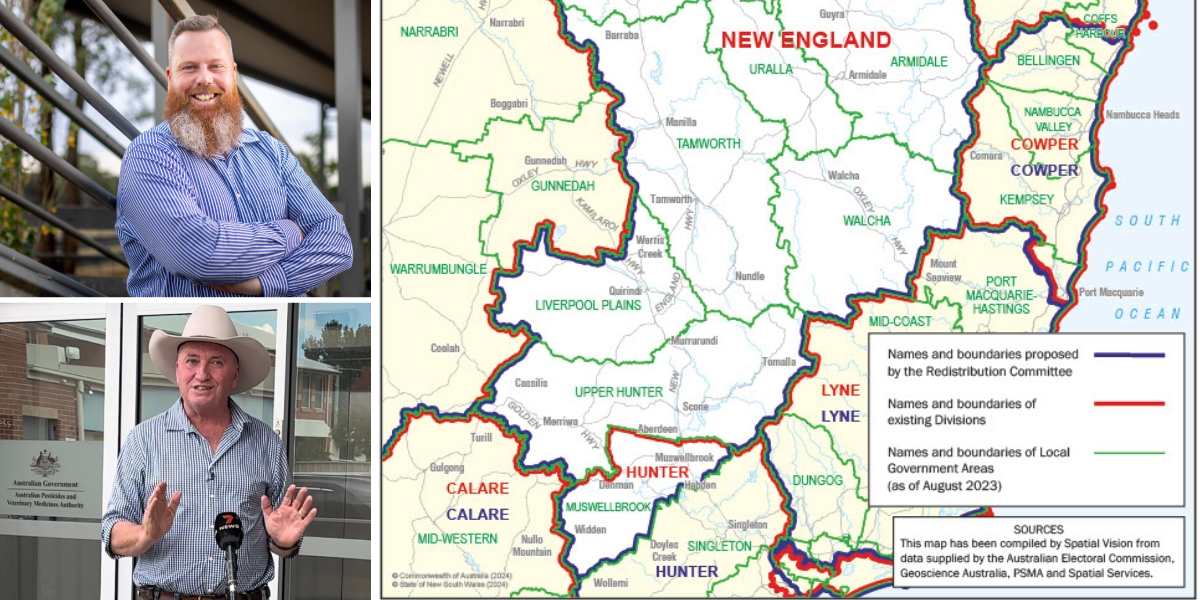In a further assault on the strong regional identities that are the Hunter and the New England, the latest proposed redistribution from the Australian Electoral Commission moves all of Muswellbrook Shire in to the seat of New England.
New South Wales is undergoing a redistribution because the number of members of the House of Representatives it is entitled to has decreased from 47 to 46 as a result of a determination made by the Electoral Commissioner on Thursday 27 July 2023. The seat of North Sydney, currently held by Teal Independent Kylea Tink, has been abolished.
The quota – or number of voters – for each electorate (outside of Tasmania and the Northern Territory*) is now 121,011. The projected enrolment for New England will be below the minimum variance, so the electorate needs to get bigger. The addition of the rest of Gwydir Shire from Parkes is logical and sensible. But instead of going further west and bringing Moree or Gunnedah – which have both historically and culturally been part of the New England North West, share state representation and rely on services in the New England – into the electorate, the AEC has gone, quite literally, in the opposite direction.
There are few places more quintessentially ‘Hunter’ than the heart of the Hunter Valley’s coal fields. And yet, the AEC has chosen to ignore that very strong sense of local identity and disconnect the Muswellbrook Shire from the vast majority of the people who work on the mines in neighbouring Singleton, Cessnock, and Maitland. Opposition from both people and organisations in Muswellbrook is expected to be strong.
Bizarrely, while completely ignoring the psychology and natural terrain differences that separate the Hunter and New England, they acknowledge that the Hunter Expressway as an appropriate border that divides the Hunter from the Newcastle metro electorates, and incorporated parts of the coast Lake Macquarie Shire into the new boundaries for the Hunter electorate, currently held by Dan Repacholi.
The changes to the borders of Parkes are more significant, with some 20,000 additional voters needing to be added to the seat. Again ignoring the natural movement and psychology of regional voters, the AEC considered but rejected a suggestion to move the remaining part of Dubbo, or the Wellington area, from Calare into Parkes, and instead made the already enormous electorate bigger by expanding south to incorporate the Bland Shire Council, Forbes Shire Council and Parkes Shire Council from the Division of Riverina.
The changes are not yet set in stone, however at this point it is rare for the AEC recommendations to be overturned without a significant opposition from both voters and political bodies. There was opposition when the Upper Hunter was moved out of the Hunter and in to the New England, but the AEC ignored it. There is always opposition to making already enormous electorates like Parkes larger, and it is always ignored.
More details and maps for the redistribution are available on the AEC website.
Written objections must be lodged no later than 6pm AEST on Friday 12 July 2024. The best way to lodge an objection is online. Objections can also be submitted via:
- Email – FedRedistribution-NSW@aec.gov.au
- Post – Australian Electoral Commission (Att: NSW Redistribution Secretariat), Locked Bag 4007, Canberra ACT 2601
- Suite 13.03, 59 Goulburn Street, Haymarket
All objections received by the deadline will be available for public inspection on the redistributions website and at the office of the Australian Electoral Officer for New South Wales in Haymarket (during business hours only) from Monday 15 July 2024. Further comments will then be accepted until 6pm AEST on Friday 26 July 2024.
*Under the constitution, a state cannot have less electorates than they did at the time of Federation, so Tasmania must have a minimum of five electorates. The number of voters in a Tasmanian electorate is around 70,000. A recent proposal to reduce the Northern Territory to one electorate was opposed strongly, and the quota there is around 77,000 voters.
Like what you’re reading? Support The New England Times by making a small contribution today and help us keep delivering local news paywall-free. Support now


